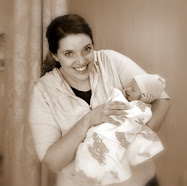http://birthfaith.org/pitocin/pitocins-untold-impact

Today’s
Midwifery Today E-News shared a quote from Michel Odent about synthetic oxytocin and the potentially detrimental impact it can have on a fetus’s oxytocin receptors. Here’s an excerpt:
80% of the blood reaching the fetus via the umbilical vein goes directly to the inferior vena cava via the ductus venosus, bypassing the liver, and therefore immediately reaching the brain: it is all the more direct since the shunts (foramen ovale and ductus arteriosus) are not yet closed. . . . Furthermore, it appears that the permeability of the blood-brain barrier can increase in situations of oxidative stress—a situation that is common when drips of synthetic oxytocin are used during labor. We have, therefore, serious reasons to be concerned if we take into account the widely documented concept of “oxytocin-induced desensitization of the oxytocin receptors.” In other words, it is probable that, at a quasi-global level, we routinely interfere with the development of the oxytocin system of human beings at a critical phase for gene-environment interaction.
Oxytocin is the hormone of love and bonding and human connection. If the oxytocin system is damaged, or a child’s oxytocin receptors become desensitized, the ramifications are huge. A brain and body with an impaired ability to release or detect oxytocin sounds like misery to me. As more and more scientists study oxytocin’s impact, we can see how crucial our body’s oxytocin systems can be for human life, love, and happiness.
Animal research suggests that oxytocin is one of our mind and body’s best defenses against stress, anxiety, and depression:
In a study presented at the 2007 Society for Neuroscience meeting, Grippo, Porges and Carter compared the stress reactions of female prairie voles living for four weeks either in isolation or with a female sibling and found greater levels of stress, behavioral anxiety and depression in those separated from their siblings. The team then gave the animals either oxytocin or saline every day during the last two weeks of the four-week period. The isolated animals treated with oxytocin no longer showed signs of depression, anxiety or cardiac stress. By contrast, oxytocin had no measurable effects on those paired with siblings, suggesting that “the effects of oxytocin are most apparent under stressful conditions,” Carter says. (Tori DeAngelis, “The two faces of oxytocin“)
If Michel Odent is right about prolonged Pitocin exposure desensitizing a fetus’s oxytocin receptors, then it’s possible that these children will grow up with impaired abilities to cope with stress, leading to higher rates of depression and anxiety.
Other research indicates that induction (and cesarean births) may lead to a higher incidence of autism:
A 2004 study out of Australia found that autistic children were twice as likely to have been born without natural labor, either by elective cesarean or induction. (Jennifer Block,
Pushed, p. 139)
And that oxytocin administration benefits autistic individuals:
[P]sychiatrist Eric Hollander, MD, of Mount Sinai School of Medicine, and colleagues found that adults diagnosed with autism or Asperger’s disorder who received oxytocin injections showed an improved ability to identify emotional content on a speech comprehension task, while those on a placebo did not. (Tori DeAngelis, “
The two faces of oxytocin“)
There are implications for drug addiction as well:
In rats, intravenous self-administration of heroin was potently decreased by [oxytocin] treatment. . . . [Oxytocin] receptors in the [central nervous system]–mainly those located in limbic and basal forebrain structures–are responsible for mediating various effects of [oxytocin] in the opiate- and cocaine-addicted organism. (Kovacs GL, Sarnyai Z, Szabo G,
Oxytocin and addiction: a review)
Someone close to me was on Prozac several years ago. He told me that, while it reduced his depression, it also reduced his ability to feel any and all emotions. He felt
nothing. Empty. From what I understand, his experience is not uncommon. Perhaps it’s because Prozac (fluoxetine) seems to “inhibit the action of oxytocin” (Cantor JM, Binik YM, Pfaus JG,
Chronic fluoxetine inhibits sexual behavior in the male rat: reversal with oxytocin). Could that empty emotional void be what it feels like to live as a child whose oxytocin receptors were damaged at birth? I shudder to think so.
A recent ACOG survey found that in 43% of malpractice suits involving neurologically impaired babies, Pitocin was to blame. (p. 137)
Even Williams Obstetrics offers a sobering history: “Oxytocin is a powerful drug, and it has killed or maimed mothers through rupture of the uterus and even more babies through hypoxia from markedly hypertonic uterine contractions.” (p. 138)
The truth is that we really don’t know all the ways synthetic oxytocin might be affecting our children (or ourselves as mothers). There are certainly situations where Pitocin use is warranted and acceptable, but those cases are far less common than current use would suggest. Without a doubt our society has a Pitocin abuse problem. How many women do you know who have been given Pitocin? How many of them do you think are aware of the potentially detrimental impact of that drug? It’s sad, isn’t it?


